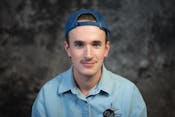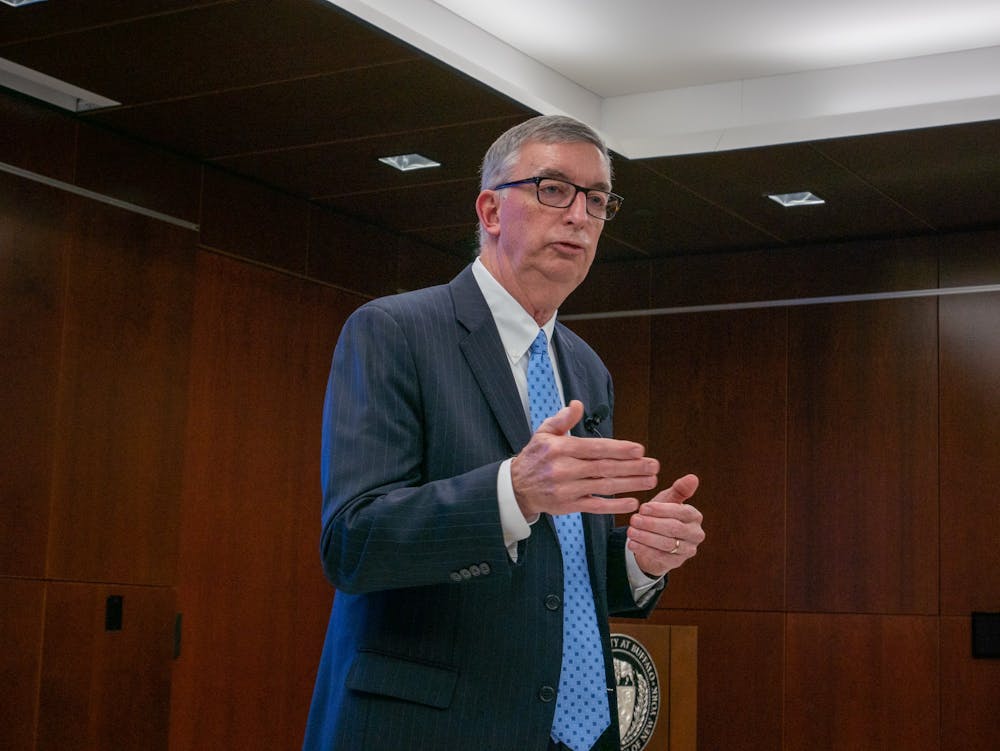UB has narrowed down its search for a new provost and executive vice president for Academic Affairs.
On Wednesday, UB’s provost search committee began a string of public forums, which end Dec. 11, for the five finalists for UB’s provost position. The forums will feature remarks from finalists and Q&A sessions for UB community members to speak with the potential second-ranking administrator at UB. Provost finalist A. Scott Weber, current interim provost and executive vice president for Academic Affairs, talked about the student government fiscal agent transition, budget models and hiring more minority faculty in the Buffalo Room on Wednesday.
Carl Lejuez, University of Kansas interim provost and executive vice chancellor, is the second hopeful for the provost position.
Weber’s forum comes roughly two months after the university announced the departure of former provost Charles Zukoski. Zukoski left on Oct. 1 to become the University of Southern California’s provost and senior vice president for academic affairs.
The search committee, made up of students, faculty and staff, landed on its five finalists and confirmed the public forums on Nov. 26. UB spokesperson Kate McKenna wrote in an email that “in keeping with usual practice, public funds are not being used to support” the provost search. Committee members have worked with search consulting firm Russell Reynolds Associates. The firm’s services are paid for by the UB Foundation, according to McKenna, and committee members are not compensated for their work on the committee.
In front of a packed Buffalo Room, Weber surveyed his roles at the university over the last 30-plus years and mentioned a “willingness to learn” as central to the provost role. He said he believes in UB’s hopes to become a “top-25 institution” but he’s more excited about the “attainment” of that merit rather than the “number.”
He emphasized the importance of faculty and staff celebration and recognition in his remarks. Moving to his vice provost role from 2010 through 2017, Weber discussed the UB Finish in 4 initiative’s increase of four-year graduation rates and the creation of an enrollment division at UB.
Weber said UB could increase “the diversity of [its] faculty,” mentioning that 5% of faculty are underrepresented minorities and faculty of color. He said, as provost, he would set a five-year goal to raise minority faculty rates to 10%.
“That’s below our Association of American Universities peers, it’s something we need to work on,” Weber said.
He closed his remarks with his glance at top research, public universities ahead of UB in academic rankings having “90% or better” first-year to second-year retention rates. UB, he said, is at 86-87%. He said UB needs a program, similar to Finish in 4, that “allows [UB] to think about cultural change to this process.”
He also referred to UB’s “3.1 out of five” reputational index and said if UB was at “3.3,” “we’d be in the top-25.” Weber said great universities in the AAU “recognize their faculty better, retain their faculty at higher rates and are diverse.”
Weber has been serving as interim provost while serving as vice president for Student Life. He said he’s “learned a lot” from his two months as interim provost and his approach to “collaborative leadership” can be an opportunity to move UB forward.
After Weber’s address, UB community members covered a number of topics in a roughly 40-minute forum.
A College of Arts and Sciences student questioned Weber about the “chaotic” rollout of the Ph.D Excellence Initiative by former provost Zukoski and asked how Weber would have initiated it as provost.
Weber said he believes it’s important to create collaborations and a consensus “in the face of great skepticism” around initiatives. He emphasized “incremental change” as being easier than “rapid, sudden change.”
“I wasn’t here [in this role], so it’s not my prerogative to say how I would have done it differently but I would say that I’m a believer that incremental change … shows a positive progression … and allows more opportunity to keep moving in the direction that you really believe is appropriate.”
Cecil Foster, former chair of the Transnational Studies department, said he was impressed by Weber’s commitment to an increase in diverse faculty. He asked Weber’s thoughts on the role of programs “that speak to the experiences and academic experiences of those who are not on the mainstream.”
Weber said students of color have told him that classes in Transnational Studies are among the most impactful in their academic experience. He said this speaks to the rich, rewarding and gratifying experiences students have with those classes.
Philip Glick, former faculty senate chair, asked about the Sub-board I/Faculty Student Association fiscal transition and how Weber, who oversaw the transition which started in May, “would have done [it] differently.”
Weber said he’s “happy to be criticized” but “hated” how UB, including himself, announced it at the end of the semester.
“But part of that was dictated by the schedule that was pushed on us by a variety of factors and I wanted to make sure that we had communicated to all the students that had participated in that process, some of which were graduating,” Weber said. “So that’s certainly not ideal, but I would still do that again, rather than wait to the following semester to roll it out because [they] had invested their thought process in that decision-making.”
Weber then discussed an “incremental change” to UB’s physical landscape and emphasized the importance of “smaller, more intimate spaces” where community members can get together on campus.
SUNY Distinguished Professor Cristanne Miller recognized that UB budget models “tend to go in the direction of supporting” numbers of student majors or “quantifiably, comparable metrics that don’t always work to give adequate support to arts and humanities.” She asked Weber if he’s willing to consider structural changes to budget models.
Weber said he is willing to consider changes, noting that UB’s budget model is “primarily dominated by historical reference.” He said the model is very enrollment-centric and it “does not value what we value in our entirety” as a university.
“Just like [when] we served on the budget committee [when UB faced state funding cuts in 2008], it’s really going to take a collaborative effort,” Weber said to Miller.
UB’s provost position was one of the top-75 paid public positions in the state in the 2018 fiscal year, as departed provost Zukoski made roughly $438,000, according to SeeThroughNY.
Lejuez, who will speak to UB community members Thursday, was hired to his position at Kansas University in April 2018. There, he earns a $410,000 annual salary, according to university records.
Last year, KU cut $20 million of its budget, which led up to nearly 60 positions being cut at the university, according to The University Daily Kansan, KU’s student newspaper. He’s since been at the “helm of developing” a new budget model for the university, which is “a hybrid” based on student credit hours and one based in merit, according to the newspaper. Lejuez has received criticism from KU graduate students, according to the newspaper, who asked Lejuez for “increased financial support” as students earn roughly $16,000 a year.
Lejuez is also one of four finalists for the provost position at KU. Lejuez, during a public forum at KU in October, said KU gave him “an opportunity when no one else would” and that “means something to” him, according to the University Daily Kansan. His CV on UB’s website is dated Oct. 1, one day after UB’s committee made a call for nominations.
Lejuez will take part in a public forum in the Buffalo Room at 3 p.m. Thursday. The other three provost finalists, who haven’t been announced via UB’s website, will speak on Dec. 9, 10 and 11 in the Buffalo Room at 3 p.m. Finalists are announced 48 hours in advance of their visits to UB, according to the university’s website.
UB’s provost search committee is seeking feedback on the provost finalists through 12 p.m. Dec. 13.
Benjamin Blanchet is the engagement editor and can be reached at benjamin.blanchet@ubspectrum.com and on Twitter @BenCBlanchet.

Benjamin Blanchet is the senior engagement editor for The Spectrum. His words have been seen in The Buffalo News (Gusto) and The Sun newspapers of Western New York. Loves cryptoquip and double-doubles.





